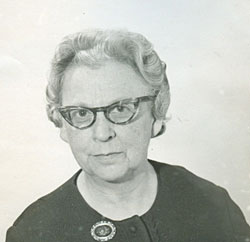
The story of Edna Byler and the development of Ten Thousand Villages is compelling. What the world now knows as the fair trade movement comes from her narrative. From one who walked the Kansas prairies as a girl and young woman comes a pivotal theme in contemporary worldwide social justice. Illustrative of this work, Forbes magazine’s September 7 issue recognized Ten Thousand Villages for its work in fair trade.
Dwight E. Roth, chair of the Hesston College Social Science Department, remembers, “As a young person, I attended Monterey Mennonite Church (now Forrest Hills) in Pennsylvania where Mrs. Byler attended for many years. She was a good friend of my mother so I got to know Mrs. Byler. Her personality matched her work. She was a remarkable woman, certainly a person of God – warm, friendly, a creative thinker. Mrs. Byler epitomized the fruit of the Spirit. It is exciting to share Mrs. Byler’s story with our students.”
Edna Ruth Miller (1904-1976) was born in a rural home between Hesston and Newton, Kansas. As a young person she was especially interested in music. She taught piano and sang on local radio shows in south central Kansas. In 1941 her husband, Joseph, started to work at MCC in various forms of international service. Starting in that year and over the next decade Edna Byler served as hostess for young adult volunteers at MCC’s Akron office. As a hostess of highest order, she was affectionately known as Mrs. B. by those close to her.
Ten Thousand Villages works with more than 130 artisan groups in more than 38 countries in Africa, Asia, and Latin America to provide fair trade jewelry, home decor, gifts, and more. As one of the world’s oldest and largest fair trade organizations, Ten Thousand Villages builds long-term relationships with artisans that are based on mutual understanding and respect.
The global fair trade movement began with the founding of Ten Thousand Villages more than 60 years ago through the visionary work of Edna Ruth Byler, a pioneering businesswoman. Byler was struck by the overwhelming poverty she witnessed during a trip to Puerto Rico in 1946, where she was moved to take action. The seminal contribution of Byler ignited a global movement to eradicate poverty through market-based solutions.
Byler believed that she could provide sustainable economic opportunities for artisans in developing countries by creating a viable marketplace for their products in North America. She began a grassroots campaign among her family and friends in the United States by selling handcrafted products out of the trunk of her car. Byler made a concerted effort to educate her community about the lives of artisans around the world.
For the next 30 years, Byler worked tirelessly to connect individual entrepreneurs in developing countries with market opportunities in North America. From humble beginnings, Ten Thousand Villages has grown to a global network of social entrepreneurs working to empower and provide economic opportunities to artisans in developing countries.
As part of Hesston College’s recognition of the visionary work of Edna Byler and the accomplishments of Ten Thousand Villages, staff members have hung Ten Thousand Villages banners in several buildings across campus. Students, staff, and faculty are excited about the banners and what they represent. Todd Lehman, campus pastor, notes, “I am excited to have the emphasis of Ten Thousand Villages on campus; the visual reminders of the banners call us to focus our attention on things outside of the dorm rooms and sidewalks of this campus. They provide fertile ground for the seeds of our dreams.”
At least four Hesston courses this fall include assignments relating to the work of Edna Byler and Ten Thousand Villages. These courses are in the areas of business, art, religion, and anthropology.
Hesston College will mark Ten Thousand Villages week November 22-28. Doug Dirks, public relations officer and master storyteller from the Akron, Pa., headquarters of Ten Thousand Villages, will speak on the topic, “Inviting artisans to our banquet” at 4 p.m., Sunday, November 22, in the Community Center of Hesston Mennonite Church. Light refreshments will be provided at the conclusion of his presentation. On Monday November 23, Dirks will speak in the Hesston College chapel at 11 a.m. in the Hesston Mennonite Church sanctuary and in classes on Tuesday, November 24. These events are free and open to the public.
During Ten Thousand Villages week the Hesston College Bookstore, in cooperation with the Ten Thousand Villages store in Newton, Kan., will offer fair trade items for purchase with proceeds to benefit Ten Thousand Villages.
Along with celebrating Edna Ruth Byler, the Hesston College emphasis on Ten Thousand Villages is being promoted to illustrate how Mennonite agencies can work together with synergistic benefits to all involved.
“The life and work of Edna Byler is a quintessential example of the Hesston College tagline, ‘Start here, Go everywhere,'” commented Dwight Roth. “Perhaps the emphasis on Ten Thousand Villages and Mrs. Byler can cause current Hesston students to develop dreams for new dynamic agencies that may be celebrated sixty years from now. These new dreams, perhaps a postmodern revival, may include ideas that we can hardly now imagine – just as Mrs. Byler could hardly imagine what her work in 1946 would be doing in 2009.”
“The mission statement of Hesston College suggests that ‘it prepares students to serve the church and world,'” Roth continued. “Toward this end, the work of Mrs. Byler is an inspiration to us all.”

